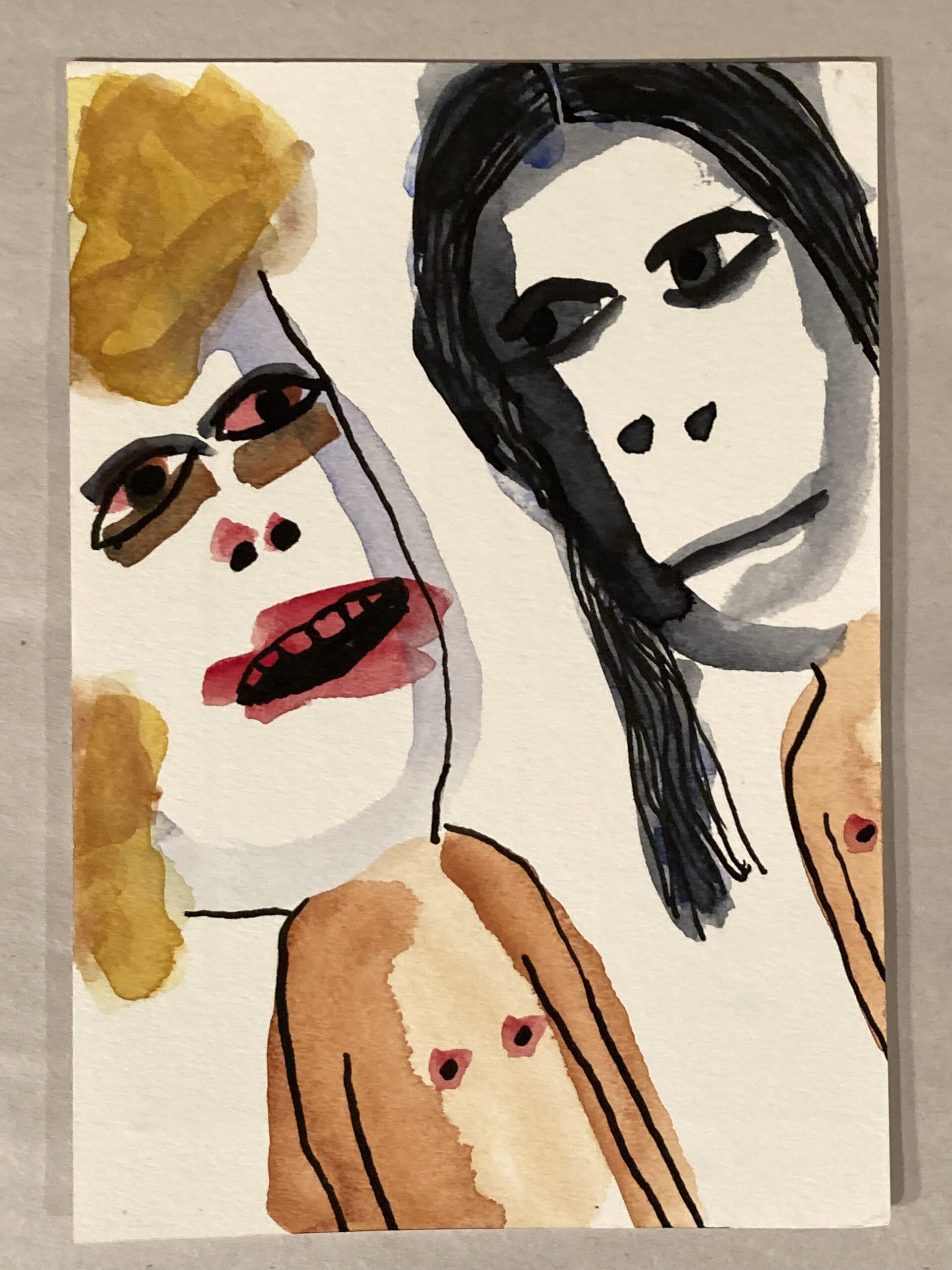
Most people knew her for her iconic arroz con pollo, the raspy voice, the baggies of crystal, her cig dangling from mouth, chopping plátano, setting down paper-plates on the plastic table in her living room for the hungry travestis to eat.
Most people knew Marquesa hugged by a cloud of smoke. They knew the papita churriá carne deshilachá sancochito’e pescao arrocito’e coco juguito’e tamarindo in to-go containers for five bucks: llévelo llévelo for later after working that culito de mundo up and down Polk Street. Plus, the Marquesa Combo with an extra ñapa could include one gram of speed to slap life a cachetá limpia and keep the suffering going.
Most people were desperate, hungry, and called her 4-1-5 landline the night before, Marquesa niña what you cooking tomorrow? Reserve me one plate, two plates. Marquesa niña Ima pay you next week when the GA comes Ima pay you después when God drops all that coin, he owes me. Sometimes the calls came too late, niña I’m out of sancocho like I’m out of hope. Marquesa would say this hugging the phone but still said travesti would show up begging for un poquito of her cooking, for un pedacito of her world. Marquesa mami give me un pisquito just the tip, just what’s stuck to the bottom of the olla. Everyone wanted to suck her dry of the little she had left, the crumbs of love, the leftovers stuck at the bottom of her own olla, the depth of her bones.
Most people knew the studio apartment on a third floor of a rundown building in the butthole of the Tenderloin, the roaches she stumped with a heel, the bed pushed to the far end corner to make space for Marquesa’s Cafetería Travesti. A round plastic table with four chairs, a Virgen del Carmen in the middle. The balada triste of Rocío Durcal coming from the small radio, wrapping the apartment in a blanket of sorrow.
The next day, dozens of travesti eyes crowded that apartment in heels in flats in long-acrylic nails in faux fur coats in thin blunts in perra where you been? In ay Marquesita more carne deshilachá, more jugo’e tamarindo, more love, more story, more of you mamilinda give us all of you, desparramadas on the plastic chairs, cross-legged on the floor, across Marquesa’s bed with the red satin cover and Jesucristo crucified nailed above, cigs on one hand fork in the other chewing on the pollito with rice sometimes breaking into dance and song sometimes a pasito tun tun when the radio spilled a favorite but always, siempre, every travesti oozing her own grief leaking her own cries her own longing her own ven que me muero into Marquesa’s Cafetería Travesti.
Everyone came for food and left with a piece of her. Every travesti consumed a chunk of Marquesa, who was the oldest among them, almost 128 human years if you count all the travesti lives she’d lived.
Deep, somewhere inside where no one could see, Marquesa carried Cartagena. She carried the war. She carried her mother’s tears wrapped around her like a 50-pound screaming child. The bleeding Sagrado Corazón de Jesús world that pushed her up north to a skyline of fog, pálpitos and tacón alto. What was she but an exiled Caribbean fantasma full of want. What was she but an abandoned ghost.
By the end of the night the girls were spent from all the eating, the shit talking. By the end of the night, the travesti sadness was a film stuck to every corner of her bedroom. Marquesa took it all in: every spilled travesti heart, every broken soul of her sisters. This tiny piece of world where, for four days out of the week, the tacón alto mafia of the underworld gathered to eat and suck the love out of Marquesa. And how she wanted that. To be the center of a world, to be sucked dry. To be hunger one day, and forgotten the next. To be wiped clean.
At dawn, Marquesa was another animal.
At dawn, the apartment was decorated by stacks of chicken bones piled high on paper-plates in every corner, their own little massacre.
At dawn, it was all a memoria. Puffed brown eyes face covered in vile and saliva glossy skin the color of tierra. What was she but all heart. What was she but a bent over hunger of rage wanting nothing but love.
At dawn, it was the want, the craving inside her to go out into the street, machete in hand and scream, With all the good people dying every day and God doesn’t finish taking my life.
At dawn, it was her own travesti telenovela.
Starring Marquesa’s unreliable heart.
Starring the 3400 miles to an unrecognizable home.
Starring los ojos de su madre.
By the time the sun rose, the knife was in her hand again, the half-ashed cig suspended on her lips as Marquesa hummed a bolero chopping the ripe plátano, messing her damn nails. By the time the sun hit full force the phone rang desesperado bringing the yearning calls of the travestis on the other side, Marquesa niña save me two plates of pollito and one plate of your heart.


Julián Delgado Lopera is the author of The New York Times acclaimed novel Fiebre Tropical (Feminist Press 2020), the Winner of the 2021 Ferro Grumley Award and a 2021 Lambda Literary award; a finalist of the 2020 Kirkus Prize in Fiction and the 2021 Aspen Literary Prize. Julián is also the author of ¡Cuéntamelo! (Aunt Lute 2017), an illustrated bilingual collection of oral histories by LGBT Latinx immigrants. Julián’s received fellowships and residencies from The National Endowment for the Arts, Black Mountain Institute, Creative Work Fund, Hedgebrook, California Arts Council, San Francisco Arts Commission, Headlands Center for The Arts. Their work has appeared in Granta, Teen Vogue, The Kenyon Review, McSweeney’s, The Rumpus, The White Review, LALT, Four Way Review, TimeOut Mag to name a few. They are the former executive director of RADAR Productions and one of the founders of Drag Queen Story Hour. Born and raised in Bogotá, Colombia, Julián currently resides in San Francisco.






